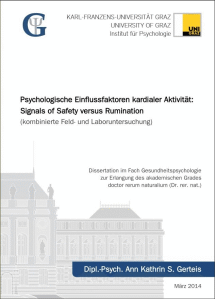OBJECTIVE. Depression and social ties could modulate risk for cardiovascular diseases. Although main aspects of depression and social interactions are intertwined, their possible interconnection is seldom considered. PURPOSE. The study aimed at relating the effects of rumination to those of social signals of safety (SoS) on vagally mediated heart rate variability (HRV), both in the laboratory and in daily life.
METHOD. The sample consisted of 122 healthy subjects (55 % female; age M=27.8yrs, SD=5.5yrs; mean WHtR=.47). Ambulatory HRV (RMSSD), respiration, body position and body movements were continuously measured via ambulatory physiological recording equipment, both in the laboratory and on 3 consecutive weekdays. Momentary social, situational and cognitive-affective variables (affect; ruminative thoughts; SoS) were assessed using a computerized diary.
RESULTS. Momentary rumination was associated with decreased HRV, both in the laboratory and in the field. Perceived SoS were associated with elevated ambulatory vagal tone as compared to being alone. Furthermore, a significant interaction between momentary rumination and perceived SoS on ambulatory HRV was found: When participants were involved in social interactions without SoS, concurrent rumination was associated with attenuated HRV compared to situations without SoS and without rumination. However, when rumination was accompanied by perceived SoS, HRV was increased.
CONCLUSION. These findings suggest a rather complex relation between perceived SoS, rumination and cardiac autonomic control. This stresses the necessity to consider the interplay of psychological and social factors in order to evaluate beneficial or adverse effects on the cardiovascular system. Furthermore, SoS proved to be an useful concept to address psychophysiological concomitants of social interactions. Limitations and health related implications of the major results are discussed.
[The study received funding by Deutsche Forschungsgemeinschaft, SCHW 1188/4-1.]

